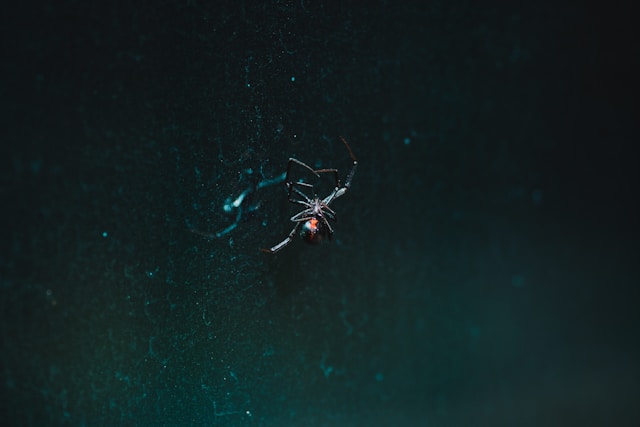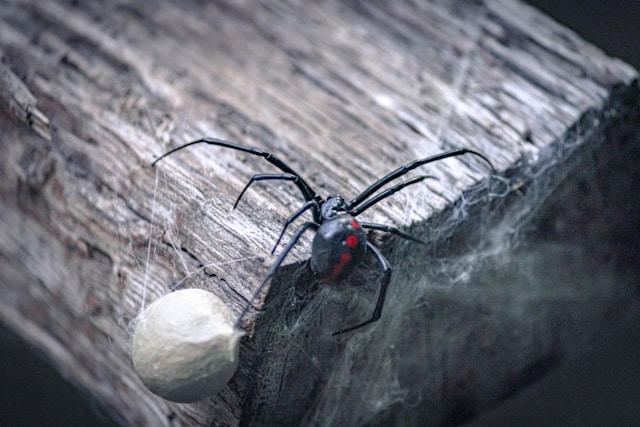Washington isn’t just known for its stunning landscapes and majestic mountains – it’s also home to a variety of brown and black spiders that might find their way into your home. In this blog post, we’ll take a closer look at these arachnid residents, getting to know them better and understanding their presence in your surroundings. Let’s dive in and learn more about brown and black spiders in Washington State!
Meet the Hobo Spider
The name shouldn’t fool you; these critters are no wandering drifters. You can find them predominantly in basements, crawl spaces, and other poorly lit areas, displaying their distinctive brownish-black coloration with discernible chevron-shaped markings on their abdomen.
Hobo spiders, scientifically known as Tegenaria agrestis, belong to the funnel weaver family. Adult females measure between 8 and 15 mm in body length, while males are slightly smaller. They have long, slender legs with a total span of approximately 25 to 35 mm.
Their venom contains toxins that can cause localized reactions, such as redness and swelling. However, severe medical consequences are extremely rare. Individuals with allergies or compromised immune systems should exercise caution, and seeking medical attention for bites is always advisable.
The Stealthy Black Widow
Now, let’s turn our attention to the black widow, a spider that has earned its reputation as one of the most notorious among the black spiders in Washington state.
The female black widow, scientifically identified as Latrodectus hesperus in this region, is easily recognized by the distinctive red hourglass marking on its abdomen. This marking serves as a visual warning, indicating the potential danger associated with its venom. The rest of the spider’s body is typically shiny black.
Black widows are known for their shy and reclusive nature. They prefer quiet, undisturbed places, making woodpiles, sheds, and outdoor structures ideal locations for their silk-made webs. These webs are low to the ground with a messy, tangled, and irregular shape.
While black widow spider venom contains neurotoxins that can affect the nervous system, fatalities are rare. Typically, most bites only result in muscle cramps and nausea. However, prompt medical attention is crucial for managing black widow bites, especially for individuals with adverse reactions or pre-existing health conditions.
In the Webs of the Giant House Spider
The giant house spider, often mistaken for the hobo spider, is distinguished by its large size and brown coloration.
These spiders prefer creating their webs in quiet corners and areas with higher humidity. Unlike some more reclusive counterparts, they are not shy about being near human habitation. Their webs are carefully woven, providing an effective means of catching flying insects that may intrude on your space.
Despite their robust appearance, giant house spiders pose little threat to humans. They are not known for aggression and are more likely to retreat than bite when approached or disturbed.
Orb-Weaving Spiders
Moving on to the lesser-known yet fascinating residents of Washington state, we have the black orb-weaving spiders, including the cross orbweaver and the shamrock orbweaver. These arachnids demonstrate remarkable skills in web craftsmanship, spinning complex webs to trap their prey.
Preferring outdoor environments, these orb-weaving spiders meticulously set up their intricate webs in gardens, shrubs, and other green spaces. Encounters with orb-weaving spiders inside homes are rare due to their preference for outdoor habitats. Regular outdoor cleaning and garden maintenance are effective preventive measures to minimize their presence.
Cross Orbweaver
The cross orbweaver, scientifically known as Araneidae Araneus diadematus, is a common orb-weaving spider in the region. Recognizable by the cross-shaped pattern on its abdomen, this spider is an adept hunter, creating circular webs to capture flying insects.
Shamrock Orbweaver
Similarly, the shamrock orbweaver (Araneidae Araneus trifolium) derives its name from the three-lobed shape on its abdomen, resembling a shamrock. These spiders are skilled weavers, constructing webs to intercept unsuspecting insects that venture too close.
The Creepy Cellar Spider
Recognized by their long, slender legs and compact bodies, these arachnids are frequent visitors to dark, damp areas such as basements and cellars.
True to their name, cellar spiders thrive in dark and damp locations, constructing loose, irregular webs. These webs serve as both shelter and hunting grounds, capturing small insects that venture into their domain.
Despite their eerie appearance, cellar spiders are harmless to humans. They are not aggressive and are more likely to flee than bite when disturbed. Their primary defense mechanism involves vibrating their webs, creating a blur that confuses potential predators or threats.
Prevention and Natura Pest Control: Your Shield Against Brown and Black Spiders in Washington State

Now that we’ve spun the web of knowledge about brown and black spiders in Washington State, here are some tips that can keep your home arachnid-free:
- Seal the Entry Points: Like uninvited guests, spiders often find their way inside through cracks and gaps. Regularly inspect and seal any potential entry points, such as gaps around windows and doors, to keep these eight-legged visitors at bay.
- Declutter and Clean: Spiders love hiding spots. Minimize their real estate by decluttering and regularly cleaning your home. Pay special attention to basements, attics, and other less frequently visited areas where spiders might set up camp.
- Reduce Favorable Conditions: Like us, spiders have preferences regarding living conditions. Keep your home well-ventilated and reduce excess moisture, as spiders are less likely to stick around in an environment that doesn’t cater to their needs.
- Landscaping Matters: Maintain a well-groomed exterior. Trim bushes and vegetation away from the house, reducing the likelihood of spiders finding their way from the garden into your living space.
Now, if you find yourself outnumbered by the brown and black spiders in Washington State or want to take preventive action, it’s time to call in the experts – Natura Pest Control. Our knowledgeable technicians understand the nuances of spider behavior and use specialized techniques to address infestations without causing harm to your family, pets, or the environment.
At Natura Pest Control, we believe in providing more than a solution; we offer peace of mind. Say goodbye to the stress of sharing your home with spiders, and let our team create a customized plan to keep your space spider-free. Contact us today!



